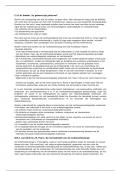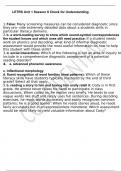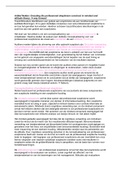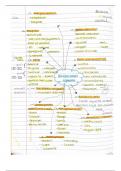1. General: Law
Law
Body of rules which a particular state or community recognizes as binding on its members or
subjects.
H.L.A. (Herbert) Hart’s Legal Positivism
Law is an elaborate set of rules supported by society:
● When there is no rule → the judge decides what is best.
● Law has everything in it to provide answers to legal problems.
▶ Law and morality are separate things.
▶ 2 Types of rules:
● Primary rules: prescriptions of prohibitions.
● Secondary rules: determine if/when the primary rules are valid.
Ronald Dworkin’s opposition To Legal Positivism
● Law not only black letter rules.
● Also moral legal standards (rights, principles, etc.).
● Relied on when there are no rules.
● Standards are often unwritten.
▶ Law has internal morality/cannot be separated from morality
Hildebrandt Agreeing With Wessel
Law should be defined through what it does (a pragmatic approach to understanding law).
3 Functions of Law
Law is multisided not one but all of those things:
1. Provide legal certainty.
2. Provide legal justice.
3. Provide instrumentality to solving societal problems.
How Legal Rules Are Different From Other Rules
● Not regularities of behaviour (as a rule, I drink coffee with breakfast).
● Legal rules are prescriptive (tell what (not) to do).
● Are binding (not discretionary, but mandatory to follow).
● Backed by state authority to enforce (if does not … court takes … to pay).
Legal Effect
Rules have an actual clear effect in the world (i.e. conviction and prison sentence for
murder). Few types:
● Something is valid/invalid (i.e. argument of legalized data transfer between US and
EU deemed invalid due to inadequate protection).
● Attributions of rights or obligations (i.e. if data is processed, I have the right to be
informed).
1
,Legal Rules Structure
If [ X ] then [ Y ]:
● X: conditions/stipulations foreseen by law (i.e. if one is parent to a child …, if data is
processed …).
● Y: legal effect/conclusion (i.e. one is under obligation to support the child …, then EU
general data protection regulation applies …).
Legal Reasoning Steps
1. Establish relevant facts:
a. What happened/is about to happen?
2. Identify relevant legal norms:
a. Legal norms can be multilevel or include sub-norms (i.e. applies in EU
territory or to targeted EU customers).
3. Interpret fact in light of norms:
a. Is data personal or information?
4. Interpret norms in light of facts:
a. If data is personal, what does the law say?
5. Conclusion/solution should follow:
a. (i.e. personal data is processed → thus GDPR applies).
▶ Alternative conclusions are possible (rules & facts can be interpreted differently).
▶ If conclusion justified by 4 steps → separates rule of law from arbitrariness.
Sources of Law
Provides legal norms with authority based on their origin and makes legal norms binding in
effect.
Legal Certainty
● Certainty of rights & obligations:
○ Can I use this → what obligations and rights do I have to respect if I do?
○ Is it legally viable (a solution)?
○ Will my ideas be protected?
● Foreseeability of consequences of one’s actions:
○ Anticipate legal viability.
○ Assess risks.
○ Protect the investment of time, money, and effort.
Justice
● As equality: equal cases should be treated equally, and unequal cases should be
treated differently.
● As fairness:
○ Distributive justice: everyone should be treated equally under equal
conditions.
○ Corrective justice: punishment proportionate to the crime, composition
proportionate to damage.
2
, Instrumentality
Law is an instrument to achieve societal goals:
● Setting goals.
● Crafting mechanism to achieve them.
Double Purpose GDPR
1. Recognize the economic benefits of data processing.
2. But also risk and hence protection.
▶ Any right, value, interest can be endangered by processing, any damage can be inflicted.
▶ Data is just a tool.
Power Relationship Models
● Model 1: Big Brother:
○ Self-censorship (effect of surveillance).
○ Fear to speak/act freely when no anonymity.
○ Role of privacy in civil society democracy.
○ Concerns both state and private surveillance.
● Model 2: Kafka’s The Trial:
○ Unaware of file existence.
○ Unaware of charges, process, and judges.
○ Unable to defend himself.
○ Concerns: unfair, non-transparent, decision-making, invisible judgment (i.e.
due process, decisional fairness).
● Model 3: Surveillance Capitalism:
○ Keywords: exploitation & manipulation (i.e. behavioral design).
○ Modern economy and governance feed on (personal) data.
○ An individual is a means to achieve (economical, political, etc.) goals.
▶ Data protection law is there to prevent and mitigate those wrongs.
2. IP: Innovation & Data
Innovation
Doing more, with less:
● Higher output from lower input.
● Data is an enabler of innovation.
Problem with Data
Usually opened by a company, locked down from redistribution by agreements or terms of
service.
Using Data & Getting Access
● What you can/cannot do:
○ IP rights to data: might grant exclusivity to their owner.
○ Contracts: even if the data is IP-free, contracts can restrict.
○ Tinkerproof devices: sensors on tractors (i.e. John Deere).
3
Law
Body of rules which a particular state or community recognizes as binding on its members or
subjects.
H.L.A. (Herbert) Hart’s Legal Positivism
Law is an elaborate set of rules supported by society:
● When there is no rule → the judge decides what is best.
● Law has everything in it to provide answers to legal problems.
▶ Law and morality are separate things.
▶ 2 Types of rules:
● Primary rules: prescriptions of prohibitions.
● Secondary rules: determine if/when the primary rules are valid.
Ronald Dworkin’s opposition To Legal Positivism
● Law not only black letter rules.
● Also moral legal standards (rights, principles, etc.).
● Relied on when there are no rules.
● Standards are often unwritten.
▶ Law has internal morality/cannot be separated from morality
Hildebrandt Agreeing With Wessel
Law should be defined through what it does (a pragmatic approach to understanding law).
3 Functions of Law
Law is multisided not one but all of those things:
1. Provide legal certainty.
2. Provide legal justice.
3. Provide instrumentality to solving societal problems.
How Legal Rules Are Different From Other Rules
● Not regularities of behaviour (as a rule, I drink coffee with breakfast).
● Legal rules are prescriptive (tell what (not) to do).
● Are binding (not discretionary, but mandatory to follow).
● Backed by state authority to enforce (if does not … court takes … to pay).
Legal Effect
Rules have an actual clear effect in the world (i.e. conviction and prison sentence for
murder). Few types:
● Something is valid/invalid (i.e. argument of legalized data transfer between US and
EU deemed invalid due to inadequate protection).
● Attributions of rights or obligations (i.e. if data is processed, I have the right to be
informed).
1
,Legal Rules Structure
If [ X ] then [ Y ]:
● X: conditions/stipulations foreseen by law (i.e. if one is parent to a child …, if data is
processed …).
● Y: legal effect/conclusion (i.e. one is under obligation to support the child …, then EU
general data protection regulation applies …).
Legal Reasoning Steps
1. Establish relevant facts:
a. What happened/is about to happen?
2. Identify relevant legal norms:
a. Legal norms can be multilevel or include sub-norms (i.e. applies in EU
territory or to targeted EU customers).
3. Interpret fact in light of norms:
a. Is data personal or information?
4. Interpret norms in light of facts:
a. If data is personal, what does the law say?
5. Conclusion/solution should follow:
a. (i.e. personal data is processed → thus GDPR applies).
▶ Alternative conclusions are possible (rules & facts can be interpreted differently).
▶ If conclusion justified by 4 steps → separates rule of law from arbitrariness.
Sources of Law
Provides legal norms with authority based on their origin and makes legal norms binding in
effect.
Legal Certainty
● Certainty of rights & obligations:
○ Can I use this → what obligations and rights do I have to respect if I do?
○ Is it legally viable (a solution)?
○ Will my ideas be protected?
● Foreseeability of consequences of one’s actions:
○ Anticipate legal viability.
○ Assess risks.
○ Protect the investment of time, money, and effort.
Justice
● As equality: equal cases should be treated equally, and unequal cases should be
treated differently.
● As fairness:
○ Distributive justice: everyone should be treated equally under equal
conditions.
○ Corrective justice: punishment proportionate to the crime, composition
proportionate to damage.
2
, Instrumentality
Law is an instrument to achieve societal goals:
● Setting goals.
● Crafting mechanism to achieve them.
Double Purpose GDPR
1. Recognize the economic benefits of data processing.
2. But also risk and hence protection.
▶ Any right, value, interest can be endangered by processing, any damage can be inflicted.
▶ Data is just a tool.
Power Relationship Models
● Model 1: Big Brother:
○ Self-censorship (effect of surveillance).
○ Fear to speak/act freely when no anonymity.
○ Role of privacy in civil society democracy.
○ Concerns both state and private surveillance.
● Model 2: Kafka’s The Trial:
○ Unaware of file existence.
○ Unaware of charges, process, and judges.
○ Unable to defend himself.
○ Concerns: unfair, non-transparent, decision-making, invisible judgment (i.e.
due process, decisional fairness).
● Model 3: Surveillance Capitalism:
○ Keywords: exploitation & manipulation (i.e. behavioral design).
○ Modern economy and governance feed on (personal) data.
○ An individual is a means to achieve (economical, political, etc.) goals.
▶ Data protection law is there to prevent and mitigate those wrongs.
2. IP: Innovation & Data
Innovation
Doing more, with less:
● Higher output from lower input.
● Data is an enabler of innovation.
Problem with Data
Usually opened by a company, locked down from redistribution by agreements or terms of
service.
Using Data & Getting Access
● What you can/cannot do:
○ IP rights to data: might grant exclusivity to their owner.
○ Contracts: even if the data is IP-free, contracts can restrict.
○ Tinkerproof devices: sensors on tractors (i.e. John Deere).
3










